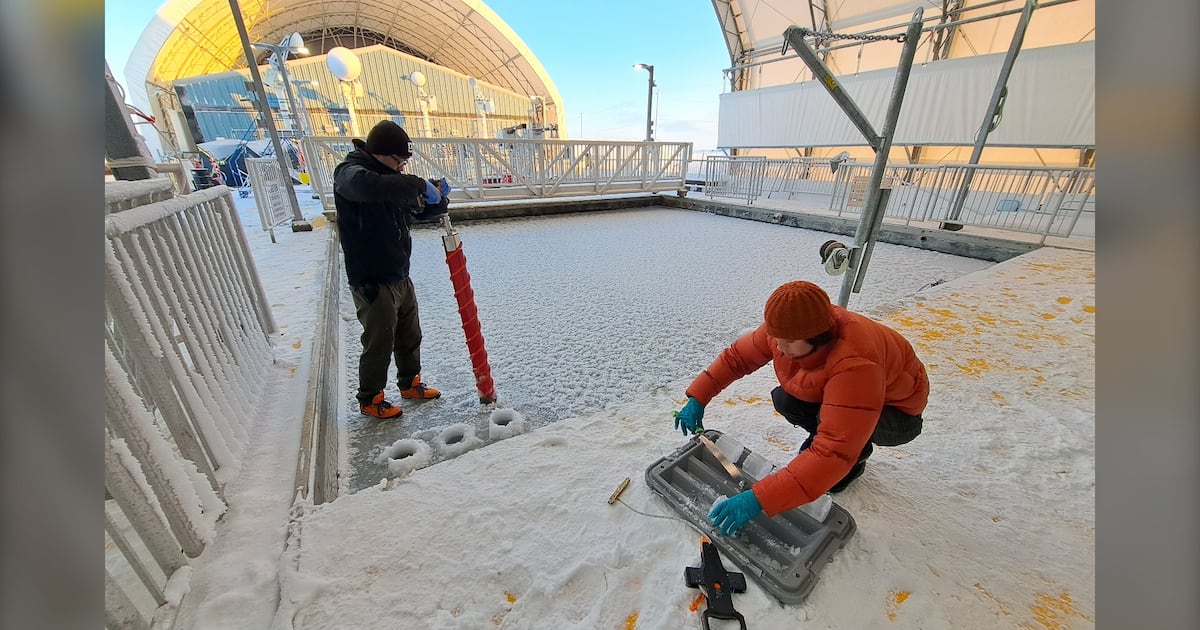Science
Churchill Marine Observatory Marks Year of Arctic Research Progress

A multidisciplinary research facility in Churchill, Manitoba, dedicated to advancing Arctic science, is celebrating its first anniversary. The Churchill Marine Observatory (CMO), which opened on August 27, 2024, aims to address “complex questions with complex, socioeconomic implications,” according to Dr. Feiyue Wang, the project lead and a professor at the University of Manitoba’s Clayton H. Riddell Faculty of Environment, Earth, and Resources.
With an investment of approximately $45 million, the CMO enables various studies by drawing seawater from the Hudson Bay and the mouth of the Churchill River. Dr. Wang noted, “This kind of arrangement allows us to do experimental studies to study different scenarios as the Hudson Bay environment undergoes rapid change.” This flexibility is crucial for preparing the region for upcoming environmental challenges.
The observatory is equipped to conduct a range of research, including risk reduction and mitigation strategies. One significant focus is on improving responses to oil spills in the region. Dr. Wang emphasized the importance of understanding how freshwater influences the marine ecosystem in the Hudson Bay, which is vital for sustainable management practices.
Monitoring capabilities at the CMO are enhanced by strings of sensors deployed along the bottom of the Churchill River and Hudson Bay. These instruments allow researchers to track both physical and biological properties of the water. The research vessel William Kennedy further facilitates sampling and monitoring efforts.
Since its opening, the CMO has supported three major research projects from November 2024 to February 2025. One project involved a collaborative study with researchers from Denmark, focusing on the early stages of thin ice formation. Another ongoing study is assessing whether natural microorganisms can effectively degrade oil in ice-covered waters, a critical consideration in the event of an oil spill. Dr. Wang mentioned that data from this study is currently being analyzed, with plans for continuation in the upcoming winter.
Looking to the future, Dr. Wang expressed a desire to see increased involvement from Indigenous researchers and community members. He highlighted that the observatory’s full-time technician hails from the northern town, underscoring the importance of local engagement. “Folks who live there, who call that region home, are the ones who are going to be more invested in it,” he stated.
Dr. Wang aims to amplify the participation of local communities in the CMO’s research, believing that their insights will greatly enhance the facility’s contributions to Arctic science. “We’ve already incorporated some local involvement, but I’d like to see that really become more prominent in the overall research direction of the CMO,” he added.
As the CMO approaches its first anniversary, its commitment to addressing pressing environmental questions remains resolute, positioning Manitoba as a significant player in global marine research.
-

 Science3 months ago
Science3 months agoToyoake City Proposes Daily Two-Hour Smartphone Use Limit
-

 Top Stories3 months ago
Top Stories3 months agoPedestrian Fatally Injured in Esquimalt Collision on August 14
-

 Health3 months ago
Health3 months agoB.C. Review Reveals Urgent Need for Rare-Disease Drug Reforms
-

 Technology3 months ago
Technology3 months agoDark Adventure Game “Bye Sweet Carole” Set for October Release
-

 World3 months ago
World3 months agoJimmy Lai’s Defense Challenges Charges Under National Security Law
-

 Lifestyle3 months ago
Lifestyle3 months agoVictoria’s Pop-Up Shop Shines Light on B.C.’s Wolf Cull
-

 Technology3 months ago
Technology3 months agoKonami Revives Iconic Metal Gear Solid Delta Ahead of Release
-

 Technology3 months ago
Technology3 months agoApple Expands Self-Service Repair Program to Canada
-

 Technology3 months ago
Technology3 months agoSnapmaker U1 Color 3D Printer Redefines Speed and Sustainability
-

 Technology3 months ago
Technology3 months agoAION Folding Knife: Redefining EDC Design with Premium Materials
-

 Business3 months ago
Business3 months agoGordon Murray Automotive Unveils S1 LM and Le Mans GTR at Monterey
-

 Technology3 months ago
Technology3 months agoSolve Today’s Wordle Challenge: Hints and Answer for August 19









